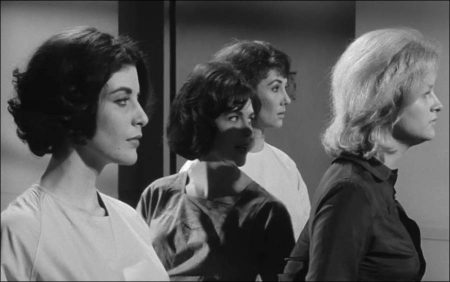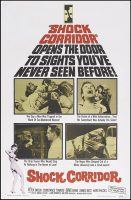Shock Corridor movie storyline. Journalist Johnny Barrett (Peter Breck) is out to solve a murder at an insane asylum but the only way he can do so is to have himself committed to the institution and solve the crime from the inside. He spends a full year being coached by professionals to convince psychiatrists that he is a fetishist who desires his sister sexually.
Posing as his sister, his girlfriend Cathy (Constance Towers) files a complaint with the police leading to Johnny’s arrest and eventual committal. Once inside he encounters a variety of mental patients but learns that there were three witnesses to the murder of the patient named Sloan.
The first was Stuart who thinks he’s a Confederate general. In a lucid moment he tells Johnny that the killer wore white pants, meaning the killer is either a doctor or an attendant. The second patient, Trent, is an African-American who hates blacks and in his mind is a member of the KKK. He can’t identify the killer but the third witness, Boden, tells him exactly who the killer is. Unfortunately for Johnny his own mental condition has been deteriorating and is now behaving erratically, to the point that even when the doctors learn of the deception, they’re not sure they can release him.
Shock Corridor is a 1963 American drama film directed and written by Samuel Fuller. The film tells the story of a journalist who gets himself intentionally committed to a mental hospital in order to solve a murder committed within the institution. Fuller originally wrote the film under the title Straitjacket for Fritz Lang in the late 1940s, but Lang wanted to change the lead character to a woman so Joan Bennett could play the role.
Shock Corridor (1963)
Directed by: Samuel Fuller
Starring: Peter Breck, Constance Towers, Gene Evans, James Best, Hari Rhodes, Larry Tucker, Paul Dubov, Chuck Roberson, Bill Zuckert, Philip Ahn, Neyle Morrow, John Matthews
Screenplay by: Samuel Fuller
Production Design by: Rudolph C. Flothow
Cinematography by: Stanley Cortez
Film Editing by: Jerome Thoms
Costume Design by: Einar Bourman
Set Decoration by: Charles S. Thompson
Art Direction by: Eugène Lourié
Music by: Paul Dunlap
MPAA Rating: None.
Distributed by: Allied Artists Pictures
Release Date: September 11, 1963 (USA)
Views: 140

